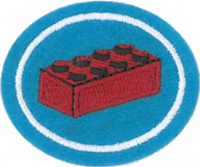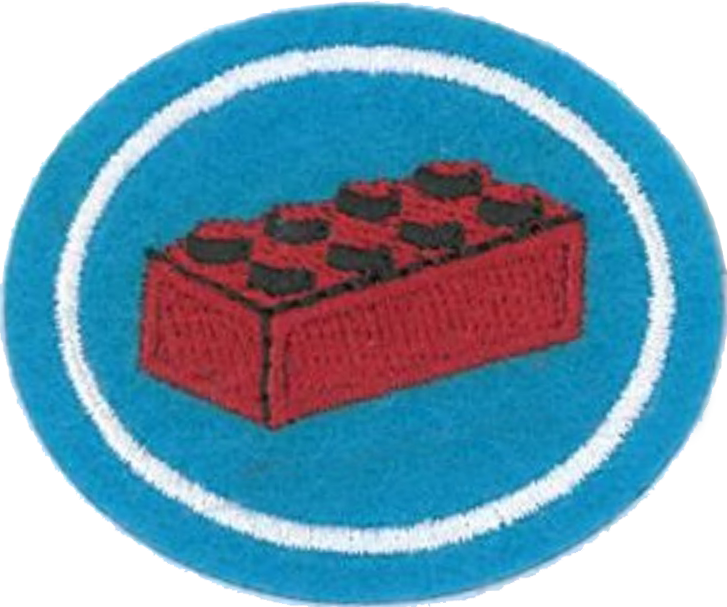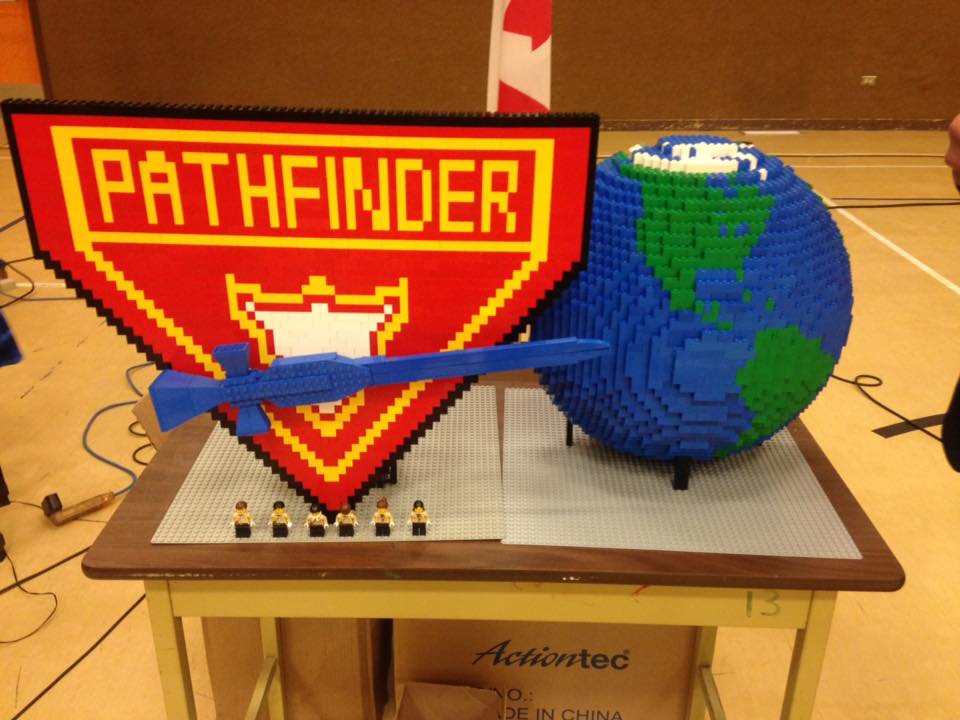Difference between revisions of "AY Honors/LEGO® Design/Answer Key 2/es"
(Created page with "Libro de respuestas de especialidades JA/Artes y actividades manuales/Construcción con LEGO® (División Norteamericana)") |
(Updating to match new version of source page) |
||
| (46 intermediate revisions by 3 users not shown) | |||
| Line 1: | Line 1: | ||
| − | + | {{HonorSubpage}} | |
| − | |||
| − | {{ | + | {{#vardefine:reqpage|{{#titleparts:{{PAGENAME}}|2}}/Requirements 2}} |
| − | | | ||
| − | | | ||
| − | |||
| − | |||
| − | |||
| − | |||
| − | |||
| − | }} | ||
| − | ==1 | + | {{ansreq|page={{#var:reqpage}}|num=1}} |
| − | + | <noinclude><div lang="en" dir="ltr" class="mw-content-ltr"> | |
| − | + | </noinclude> | |
| − | + | <!-- 1. Know the following terms: --> | |
| − | + | <noinclude> | |
| − | + | </div></noinclude> | |
| − | |||
| − | |||
| − | |||
| − | |||
| − | |||
| − | |||
| − | |||
| − | + | {{ansreq|page={{#var:reqpage}}|num=1a}} | |
| + | <noinclude><div lang="en" dir="ltr" class="mw-content-ltr"> | ||
| + | </noinclude> | ||
| + | Any item made by LEGO. For example: Bricks, plates, tiles, all minfigure parts and accessories. | ||
| + | <noinclude> | ||
| + | </div></noinclude> | ||
| + | {{CloseReq}} <!-- 1a --> | ||
| − | == | + | {{ansreq|page={{#var:reqpage}}|num=1b}} |
| + | <noinclude><div lang="en" dir="ltr" class="mw-content-ltr"> | ||
| + | </noinclude> | ||
| + | The round connection point on top of a standard brick. | ||
| + | <noinclude> | ||
| + | </div></noinclude> | ||
| + | {{CloseReq}} <!-- 1b --> | ||
| − | === | + | {{ansreq|page={{#var:reqpage}}|num=1c}} |
| + | <noinclude><div lang="en" dir="ltr" class="mw-content-ltr"> | ||
| + | </noinclude> | ||
| + | A standard plastic element. Usually 6 sided (including top and bottom) and ranging in widths and lengths between 1 and 16 studs. | ||
| + | <noinclude> | ||
| + | </div></noinclude> | ||
| + | {{CloseReq}} <!-- 1c --> | ||
| − | === | + | {{ansreq|page={{#var:reqpage}}|num=1d}} |
| + | <noinclude><div lang="en" dir="ltr" class="mw-content-ltr"> | ||
| + | </noinclude> | ||
| + | A flat plastic element. One third the height of a brick element. | ||
| + | <noinclude> | ||
| + | </div></noinclude> | ||
| + | {{CloseReq}} <!-- 1d --> | ||
| − | + | {{ansreq|page={{#var:reqpage}}|num=1e}} | |
| + | <noinclude><div lang="en" dir="ltr" class="mw-content-ltr"> | ||
| + | </noinclude> | ||
| + | A flat plastic element with no attachment points on the bottom and thinner than a standard plate. | ||
| + | <noinclude> | ||
| + | </div></noinclude> | ||
| + | {{CloseReq}} <!-- 1e --> | ||
| − | === | + | {{ansreq|page={{#var:reqpage}}|num=1f}} |
| + | <noinclude><div lang="en" dir="ltr" class="mw-content-ltr"> | ||
| + | </noinclude> | ||
| + | Similar to a plate however with no attachment points or studs on top. | ||
| + | <noinclude> | ||
| + | </div></noinclude> | ||
| + | {{CloseReq}} <!-- 1f --> | ||
| − | + | {{ansreq|page={{#var:reqpage}}|num=1g}} | |
| + | <noinclude><div lang="en" dir="ltr" class="mw-content-ltr"> | ||
| + | </noinclude> | ||
| + | A brick that has been modified to have a downward incline. The top of the brick has fewer connection points than the bottom of the brick. | ||
| + | <noinclude> | ||
| + | </div></noinclude> | ||
| + | {{CloseReq}} <!-- 1g --> | ||
| − | + | {{ansreq|page={{#var:reqpage}}|num=1h}} | |
| + | <noinclude><div lang="en" dir="ltr" class="mw-content-ltr"> | ||
| + | </noinclude> | ||
| + | A brick that has been modified to have an upward incline. The top of the brick has more connection points than the bottom of the brick. | ||
| + | <noinclude> | ||
| + | </div></noinclude> | ||
| + | {{CloseReq}} <!-- 1h --> | ||
| − | + | {{ansreq|page={{#var:reqpage}}|num=1i}} | |
| + | <noinclude><div lang="en" dir="ltr" class="mw-content-ltr"> | ||
| + | </noinclude> | ||
| + | One or more elements that are combined to allow connected pieces to move in any range of motion. | ||
| + | <noinclude> | ||
| + | </div></noinclude> | ||
| + | {{CloseReq}} <!-- 1i --> | ||
| − | == | + | {{ansreq|page={{#var:reqpage}}|num=1j}} |
| + | <noinclude><div lang="en" dir="ltr" class="mw-content-ltr"> | ||
| + | </noinclude> | ||
| + | Specialized elements that are designed to connect with axles and pins. These may or may not have standard connect points. | ||
| + | <noinclude> | ||
| + | </div></noinclude> | ||
| + | {{CloseReq}} <!-- 1j --> | ||
| − | === | + | {{ansreq|page={{#var:reqpage}}|num=1k}} |
| + | <noinclude><div lang="en" dir="ltr" class="mw-content-ltr"> | ||
| + | </noinclude> | ||
| + | Elements that are designed to store, carry, and use electricity. For example: Battery Packs, power cords, lights, motors, remote controls, and remote control receivers. | ||
| + | <noinclude> | ||
| + | </div></noinclude> | ||
| + | {{CloseReq}} <!-- 1k --> | ||
| − | === | + | {{ansreq|page={{#var:reqpage}}|num=1l}} |
| + | <noinclude><div lang="en" dir="ltr" class="mw-content-ltr"> | ||
| + | </noinclude> | ||
| + | Typically 4 elements that make up a LEGO person: 1. Hat, hair, helmet, etc.; 2. Head; 3. Torso, usually includes arms and hands; 4. Legs, usually includes waist. | ||
| + | <noinclude> | ||
| + | </div></noinclude> | ||
| + | {{CloseReq}} <!-- 1l --> | ||
| − | == | + | <!--T:15--> |
| + | More information on types of parts and their actual names: [http://guide.lugnet.com/partsref/ Lugnet Parts Ref] | ||
| + | {{CloseReq}} <!-- 1 --> | ||
| + | {{ansreq|page={{#var:reqpage}}|num=2}} | ||
| + | <noinclude><div lang="en" dir="ltr" class="mw-content-ltr"> | ||
| + | </noinclude> | ||
| + | <!-- 2. Build and/or find examples of following types of scale models: --> | ||
| + | </div> | ||
| − | + | <div lang="en" dir="ltr" class="mw-content-ltr"> | |
| + | <noinclude> | ||
| + | </div></noinclude> | ||
| + | {{ansreq|page={{#var:reqpage}}|num=2a}} <!--T:22--> | ||
| + | <noinclude><div lang="en" dir="ltr" class="mw-content-ltr"> | ||
| + | </noinclude> | ||
| + | These are a range of scales where the size of a person is smaller than a minifigure. | ||
| + | <noinclude> | ||
| + | </div></noinclude> | ||
| + | {{CloseReq}} <!-- 2a --> | ||
| + | {{ansreq|page={{#var:reqpage}}|num=2b}} <!--T:23--> | ||
| + | <noinclude><div lang="en" dir="ltr" class="mw-content-ltr"> | ||
| + | </noinclude> | ||
| + | These are builds proportioned to the size of a standard minifigure. | ||
| + | <noinclude> | ||
| + | </div></noinclude> | ||
| + | {{CloseReq}} <!-- 2b --> | ||
| + | {{ansreq|page={{#var:reqpage}}|num=2c}} <!--T:24--> | ||
| + | <noinclude>[[File:Lego Design.jpg]] | ||
| − | + | {{clear}} | |
| − | + | {{clear}} | |
| − | + | {{clear}} | |
| − | === | + | <div lang="en" dir="ltr" class="mw-content-ltr"> |
| + | <noinclude> | ||
| + | </div></noinclude> | ||
| + | {{CloseReq}} <!-- 2c --> | ||
| + | {{CloseReq}} <!-- 2 --> | ||
| + | {{ansreq|page={{#var:reqpage}}|num=3}} | ||
| + | <noinclude><div lang="en" dir="ltr" class="mw-content-ltr"> | ||
| + | </noinclude> | ||
| + | <!-- 3. Choose one of the following: --> | ||
| + | </div> | ||
| − | === | + | <div lang="en" dir="ltr" class="mw-content-ltr"> |
| + | <noinclude> | ||
| + | </div></noinclude> | ||
| + | {{ansreq|page={{#var:reqpage}}|num=3a}} <!--T:25--> | ||
| + | <noinclude><div lang="en" dir="ltr" class="mw-content-ltr"> | ||
| + | </noinclude> | ||
| + | </div> | ||
| − | === | + | <div lang="en" dir="ltr" class="mw-content-ltr"> |
| + | <noinclude> | ||
| + | </div></noinclude> | ||
| + | {{CloseReq}} <!-- 3a --> | ||
| − | == | + | {{ansreq|page={{#var:reqpage}}|num=3b}} <!--T:26--> |
| + | <noinclude><div lang="en" dir="ltr" class="mw-content-ltr"> | ||
| + | </noinclude> | ||
| + | </div> | ||
| − | === | + | <div lang="en" dir="ltr" class="mw-content-ltr"> |
| − | + | <noinclude> | |
| + | </div></noinclude> | ||
| + | {{CloseReq}} <!-- 3b --> | ||
| + | {{CloseReq}} <!-- 3 --> | ||
| + | {{ansreq|page={{#var:reqpage}}|num=4}} | ||
| + | <noinclude><div lang="en" dir="ltr" class="mw-content-ltr"> | ||
| + | </noinclude> | ||
| + | <!-- 4. Choose one of the following: --> | ||
| + | </div> | ||
| − | + | <div lang="en" dir="ltr" class="mw-content-ltr"> | |
| + | You are working on the [[AY Honors/Christian_Storytelling|Christian Storytelling]] honor right? | ||
| + | </div> | ||
| − | + | También podría incluir esto como una forma de comunicar el requisito «visual» para muchos de las especialidades más nuevas de la naturaleza.</noinclude> | |
| − | + | {{CloseReq}} <!-- 4 --> | |
| − | |||
| − | == | + | {{ansreq|page={{#var:reqpage}}|num=5}} |
| − | + | <noinclude>{{clear}} | |
| − | |||
| − | == | + | <div lang="en" dir="ltr" class="mw-content-ltr"> |
| − | <noinclude></noinclude> | + | <noinclude> |
| + | </div></noinclude> | ||
| + | {{ansreq|page={{#var:reqpage}}|num=5a}} | ||
| + | <noinclude><div lang="en" dir="ltr" class="mw-content-ltr"> | ||
| + | </noinclude> | ||
| + | </div> | ||
| + | |||
| + | <div lang="en" dir="ltr" class="mw-content-ltr"> | ||
| + | <noinclude> | ||
| + | </div></noinclude> | ||
| + | {{CloseReq}} <!-- 5a --> | ||
| + | {{ansreq|page={{#var:reqpage}}|num=5b}} | ||
| + | <noinclude><div lang="en" dir="ltr" class="mw-content-ltr"> | ||
| + | </noinclude> | ||
| + | </div> | ||
| + | |||
| + | <div lang="en" dir="ltr" class="mw-content-ltr"> | ||
| + | <noinclude> | ||
| + | </div></noinclude> | ||
| + | {{CloseReq}} <!-- 5b --> | ||
| + | {{ansreq|page={{#var:reqpage}}|num=5c}} | ||
| + | <noinclude><div lang="en" dir="ltr" class="mw-content-ltr"> | ||
| + | </noinclude> | ||
| + | </div> | ||
| + | |||
| + | <div lang="en" dir="ltr" class="mw-content-ltr"> | ||
| + | <noinclude> | ||
| + | </div></noinclude> | ||
| + | {{CloseReq}} <!-- 5c --> | ||
| + | {{ansreq|page={{#var:reqpage}}|num=5d}} | ||
| + | <noinclude><div lang="en" dir="ltr" class="mw-content-ltr"> | ||
| + | </noinclude> | ||
| + | </div> | ||
| + | |||
| + | <div lang="en" dir="ltr" class="mw-content-ltr"> | ||
| + | <noinclude> | ||
| + | </div></noinclude> | ||
| + | {{CloseReq}} <!-- 5d --> | ||
| + | {{ansreq|page={{#var:reqpage}}|num=5e}} | ||
| + | <noinclude><div lang="en" dir="ltr" class="mw-content-ltr"> | ||
| + | </noinclude> | ||
| + | </div> | ||
| + | |||
| + | <div lang="en" dir="ltr" class="mw-content-ltr"> | ||
| + | <noinclude> | ||
| + | </div></noinclude> | ||
| + | {{CloseReq}} <!-- 5e --> | ||
| + | {{CloseReq}} <!-- 5 --> | ||
| + | |||
| + | {{ansreq|page={{#var:reqpage}}|num=6}} | ||
| + | <noinclude><div lang="en" dir="ltr" class="mw-content-ltr"> | ||
| + | </noinclude> | ||
| + | <!-- 6. From your imagination create your own design in 2 of the 5 categories below and share both designs with your group or club. --> | ||
| + | </div> | ||
| + | |||
| + | <div lang="en" dir="ltr" class="mw-content-ltr"> | ||
| + | <noinclude> | ||
| + | </div></noinclude> | ||
| + | {{ansreq|page={{#var:reqpage}}|num=6a}} <!--T:31--> | ||
| + | <noinclude><div lang="en" dir="ltr" class="mw-content-ltr"> | ||
| + | </noinclude> | ||
| + | </div> | ||
| + | |||
| + | <div lang="en" dir="ltr" class="mw-content-ltr"> | ||
| + | <noinclude> | ||
| + | </div></noinclude> | ||
| + | {{CloseReq}} <!-- 6a --> | ||
| + | {{ansreq|page={{#var:reqpage}}|num=6b}} <!--T:9--> | ||
| + | <noinclude><div lang="en" dir="ltr" class="mw-content-ltr"> | ||
| + | </noinclude> | ||
| + | </div> | ||
| + | |||
| + | <div lang="en" dir="ltr" class="mw-content-ltr"> | ||
| + | <noinclude> | ||
| + | </div></noinclude> | ||
| + | {{CloseReq}} <!-- 6b --> | ||
| + | {{CloseReq}} <!-- 6 --> | ||
| + | {{ansreq|page={{#var:reqpage}}|num=7}} | ||
| + | <noinclude><div lang="en" dir="ltr" class="mw-content-ltr"> | ||
| + | </noinclude> | ||
| + | <!-- 7. Write a 250 word paragraph, or in a 3-5 minute presentation to your group or club, tell how you can use LEGO® to witness to those that don’t know about God. --> | ||
| + | Stop Motion Animation using LEGO® can be a great use to show events that happened in the Bible in a cool, fun way.--> | ||
| + | </div> | ||
| + | |||
| + | <div lang="en" dir="ltr" class="mw-content-ltr"> | ||
| + | <noinclude> | ||
| + | </div></noinclude> | ||
| + | {{CloseReq}} <!-- 7 --> | ||
| + | {{ansreq|page={{#var:reqpage}}|num=Note}} | ||
| + | <noinclude><div lang="en" dir="ltr" class="mw-content-ltr"> | ||
| + | </noinclude> | ||
| + | <!-- Notes --> | ||
| + | LEGO®, the LEGO® logo and the minifigure are trademarks and/or copyrights of The LEGO® Group. | ||
| + | Pathfinders and the Seventh-day Adventist Church are not affiliated with and/or facilitated by The LEGO® Group. | ||
| + | </div> | ||
| + | |||
| + | <div lang="en" dir="ltr" class="mw-content-ltr"> | ||
| + | <noinclude> | ||
| + | </div></noinclude> | ||
| + | {{CloseReq}} <!-- Note --> | ||
| + | <noinclude>==Referencias==</noinclude> | ||
| + | |||
| + | [[Category:AY Honors/noindex{{GetLangSuffix}}|{{SUBPAGENAME}}]] | ||
| + | {{CloseHonorPage}} | ||
Latest revision as of 14:58, 3 January 2023
Nivel de destreza
1
Año
2014
Version
13.02.2026
Autoridad de aprobación
División Norteamericana
1
1a
Any item made by LEGO. For example: Bricks, plates, tiles, all minfigure parts and accessories.
1b
The round connection point on top of a standard brick.
1c
A standard plastic element. Usually 6 sided (including top and bottom) and ranging in widths and lengths between 1 and 16 studs.
1d
A flat plastic element. One third the height of a brick element.
1e
A flat plastic element with no attachment points on the bottom and thinner than a standard plate.
1f
Similar to a plate however with no attachment points or studs on top.
1g
A brick that has been modified to have a downward incline. The top of the brick has fewer connection points than the bottom of the brick.
1h
A brick that has been modified to have an upward incline. The top of the brick has more connection points than the bottom of the brick.
1i
One or more elements that are combined to allow connected pieces to move in any range of motion.
1j
Specialized elements that are designed to connect with axles and pins. These may or may not have standard connect points.
1k
Elements that are designed to store, carry, and use electricity. For example: Battery Packs, power cords, lights, motors, remote controls, and remote control receivers.
1l
Typically 4 elements that make up a LEGO person: 1. Hat, hair, helmet, etc.; 2. Head; 3. Torso, usually includes arms and hands; 4. Legs, usually includes waist.
More information on types of parts and their actual names: Lugnet Parts Ref
2
2a
These are a range of scales where the size of a person is smaller than a minifigure.
2b
These are builds proportioned to the size of a standard minifigure.
2c
3
3a
3b
4
You are working on the Christian Storytelling honor right?
También podría incluir esto como una forma de comunicar el requisito «visual» para muchos de las especialidades más nuevas de la naturaleza.
5
5a
5b
5c
5d
5e
6
6a
6b
7
Stop Motion Animation using LEGO® can be a great use to show events that happened in the Bible in a cool, fun way.-->
Note
LEGO®, the LEGO® logo and the minifigure are trademarks and/or copyrights of The LEGO® Group. Pathfinders and the Seventh-day Adventist Church are not affiliated with and/or facilitated by The LEGO® Group.



